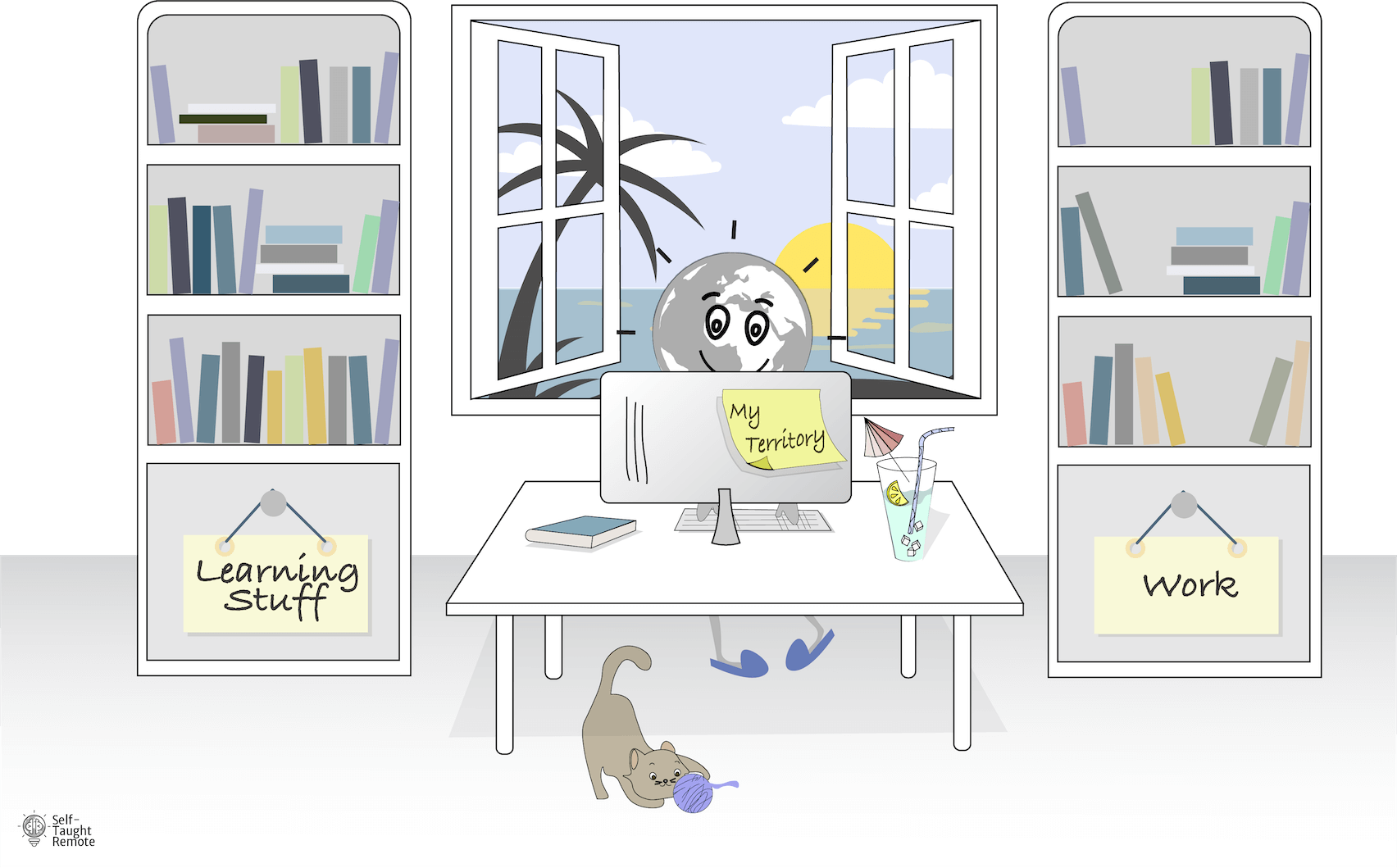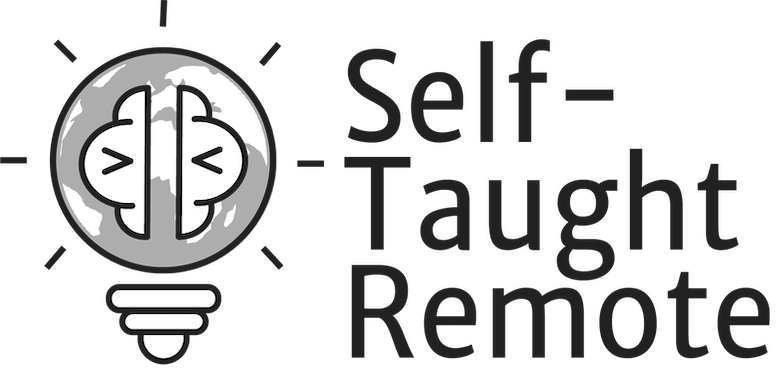Why self-education and remote work goes hands in hand ? Here are 5 main reasons

What do you think will happen if a fish is taken from their natural environment: water, and put to the land? Well, without millions of years of evolution my prediction is not optimistic regarding the ability of the fish to survive. What would happen if a person whose environment always included different people, in-person communication, and in-person collaboration would enter an environment where they work alone in front of the laptop screen like it is in remote work?
I believe consequences would not be as tragic as in the fish case, but the person would need to go through personal "evolution" to start feeling comfortable in this environment. Do you think there is a way to make it less painful?
And this is the reason I wrote this post. I want to show you the reasons why being self-taught will help you to develop the skills and abilities necessary for being a great remote developer naturally. You should definitely read it If you consider becoming a remote-first Software Developer or any other remote tech professional. But if you are just curious how self-education and remote work goes hand in hand, I am happy to serve you. Enjoy the reading!
Reason 1: Self-education teaches you to manage yourself
When you working remotely, you are not in the office where you are socially pressured by colleagues and the manager to appear working. Most probably you are at home, and different habits associated with the home environment will try to highjack you. In remote work, it is extremely important to be able to manage yourself, your time, and be disciplined. Which is often a trial and error approach. Gues would you have this problem if you were self-taught?
You might have guessed that most probably you would not. Self-education requires you to learn to manage yourself even at a greater level than remote work. In remote work you dive into an environment that has at least some working system and structure, you can rely on. While during self-education you build them from scratch which requires a lot more discipline and self-management. So it is inevitable to gain a great level of those skills while doing self-education.
Reason 2: Self-education makes you more comfortable working alone
One of the main struggles newcomers to the remote world experience is loneliness. Why is that?
Let's recap the "Matrix" we are all in. Rember, school, sports section, college, first job. Going through any combination of these stages of life we were physically surrounded by classmates, teammates, and colleagues. We were chatting, collaborating, and hanging out with them in person most of the time. And all of it was happening by default. It just became second nature for us.
When from this environment you dive into a remote work environment, you are not surrounded by people anymore. And this often causes a feeling of loneliness which lasts some period of time while your organism adapts. So how self-education could have helped in this situation?
Well, self-education is something you do by yourself, hence you are also alone most of the time. While doing it, you also going through overcoming loneliness. But it happens a lot smoother rather than in the working environment as there is no pressure to meet someone's performance expectations while you overcoming loneliness. During self-education, you get used to working alone and how to be proactive in doing social activities. And then when you land a remote work as a self-taught, you have this problem solved.
Reason 3: If you become self-taught, you know how to fight distractions
Let's imagine the same scenario, you switched your office job to a remote one, so no office, no colleagues around, no boss behind you back. But there are text messages or a call from a friend, an interesting email popped up, your pet wants to play, someone watching your favorite show on TV, and so on. Let's call them Personal Distructions. All of them are whispering to you: "Hey, put a few minutes of your attention to me, no one at your work will even notice it". And they are right, no one will notice. But you will and results will eventually show it.
You might argue that there are also distractions at the office. I agree, there are even a greater amount of distractions at the office which is a combination of Office Distructions and Personal Distructions. While you can not always influence the first type of destructors in the office, Personal Distructions are usually easier to manage. As it is usually noticeable by your colleagues.
One other thing is that successful self-education requires is deep focus and concentration. I would probably never understand the *Asymptotic computational complexity* concepts without giving it all the focus I have to the process.
When you do the first steps in self-education you also face the reality of being distracted. But you notice that you can not move forward unless you learn how to eliminate all of them. You will be searching for your way to do it, and you will find it.
If you are self-taught, you definitely have your way to handle all the Personal Distructions.
Reason 4: Self-education develop your e-communication skills
When you work in a distributed team, you can not just approach someone and start a conversation as you get used to in the office. All remote work is based on e-communication. They include messages, audio or video conferences, screen recording, etc. And being skillful in working with them is crucial.
If you are new to this, It can be really uncomfortable to initiate any e-conversation with your remote colleague when you have a question to ask or something to discuss. If you write a message with a question regarding some problem you are working on, you need to write it as clearly as possible. You should provide all the additional context which will help the colleague to understand where you at. As your they most probably in a totally different context hen you.
Another aspect of it is being comfortable in front of the camera. Video conferences are part of the daily routine in remote-first teams. And it is something you were really doing while going through the traditional education system and in-office work. Unless you are a fan of online video games. And being in front of a camera can be really uncomfortable in the beginning.
When you do self-education, it is often the case that you need to ask for help from someone you do not know. And usually, you do it using e-communication. You write a message, comment, email, do a screen share or screen recording, etc. And it will be important to write a mini-essay for them to describe all you are working on first and then formulate a question of the problem you faced. Also, I noticed that some online courses ask you to record a video of yourself as one of the assignments which help to get a taste of being in front of the camera.
When you do self-education, e-communication becomes more natural to you.
Reason 5: You create your "territory" during self-education
Let's touch on one of the other aspects of human performance: psychology. When we attend a school for the first time of changing a school, we feel uncomfortable for some time as it is a new place for us. And it is usually impacting our performance. But then we got used to it, we start liking it and performance improves. Same for the college as well as for the office job. We start a new office job, our performance degrades due to a new environment, new people, new ways to do things. But our psychology adapts and you get better after some time.
This concept is something Steven Presffild described as "territory".
"There's a three-legged coyote who lives up the hill from me. All the garbage cans in the neighborhood belong to him. It's his territory. Every now and then some four-legged intruder tries to take over. They can't do it. On his home turf, even a peg-leg critter is invincible." - Stevent Pressfield, The War Of Art
To pull it a bit out of the shade of abstraction here are a couple of real examples. When Arnold Shwartzneger enters a gym, it is his territory. When Lionel Messi enters the stadium, it is his territory. Steve Jobs's territory was Apple. My territory Is my laptop and the working environment I set up for myself.
When you do self-education you are creating your "territory". Place where you overcame many obstacles, where you are the most productive and confident in your abilities. And when you join a remote-first company, it is not as dramatically impact your performance as an in-office jobs case. Because you will already be at your "territory".
Summary
Remote work is totally different than in-office one. It requires you to overcome loneliness and Personal Distructions as well as becoming skillful in self-management and e-communication. That is why it is hard to transfer yourself from the traditional environment where you were surrounded by people and directly and indirectly managed to the remote-first one.
However, if you choose the way of the self-taught, you will overcome those obstacles and acquire those skills naturally. Self-education prepares you to work remotely without losing the skill to work in a traditional working environment.


Serge
Totally agree. It’s a good article!
fabrikamebeli.in.ua
An interesting discussion is definitely worth comment.
I do believe that you should write more on this issue,
it might not be a taboo subject but generally folks don't discuss these issues.
To the next! Cheers!!